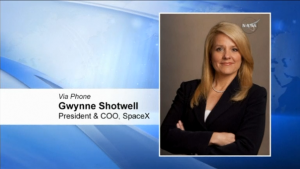
JUNE 29 (Reuters) — SpaceX President Gwynne Shotwell said an investigation into Sunday’s explosion shortly after launch of one of the company’s Falcon 9 rockets will ground the rockets for several months but less than a year.
“We’re certainly in an extraordinary position to know what happened, to find what happened, to fix what happened and to get back to flight, given the fact that the majority of this launch vehicle and its components are ours,” Shotwell said at a news conference. “It’s certainly not going to be a year.”
The rocket was on a mission to resupply the International Space Station. SpaceX founder Elon Musk said on Twitter a preliminary analysis indicated a problem with the rocket’s upper-stage engine.
“This is a blow to us,” said William Gerstenmaier, NASA’s Associate Administrator for Human Exploration and Operations. “We lost a lot of important research equipment on this flight.”
The spacecraft lost on Sunday carried 5,461 pounds (2,477 kg) of food, clothing, equipment and science experiments for the station, a $100 billion research laboratory that flies about 260 miles (420 km) above Earth. The crew on the International Space Station has about four months of food and supplies on board, so the accident does not pose an immediate problem for them.
NASA Administrator Charles Bolden said Sunday’s explosion shortly after liftoff of unmanned SpaceX rocket carrying supplies to the International Space Station will not deter the agency’s human spaceflight program.
He said the commercial cargo program was designed to accommodate the loss of cargo vehicles. “We will work closely with SpaceX to understand what happened, fix the problem and return to flight,” Bolden said in a statement.
The Space Exploration Technologies rocket exploded about three minutes after liftoff from Cape Canaveral Air Force Station in Florida on Sunday, destroying a cargo ship bound for the International Space Station, according to NASA.
The accident occurred just before the rocket was to discard its first stage.
It wasn’t immediately clear if the rocket broke apart on its own, or if Air Force range safety officers detonated explosives on the rocket, part of a system to ensure wayward boosters don’t impact populated areas, NASA said.
The 208-foot-tall (63-meter) rocket was the company’s 19th Falcon 9 launch since its 2010 debut, including six previous cargo runs for NASA under a 15-flight contract worth more than $2 billion.
The accident soon after liftoff from Cape Canaveral Air Force Station was the second successive botched mission to resupply the space station. A Russian Progress cargo ship failed to reach the outpost in April following a problem with its Soyuz launcher. Russia plans to launch a replacement capsule on Friday.








